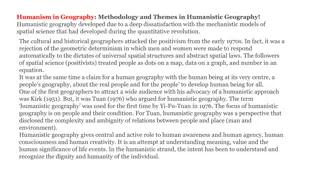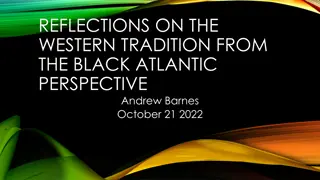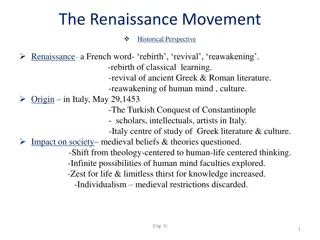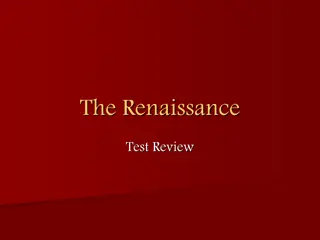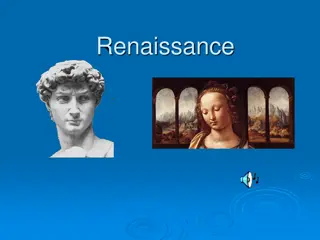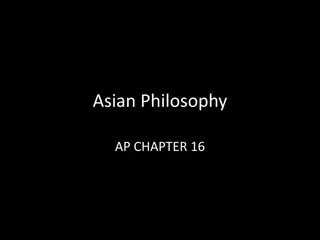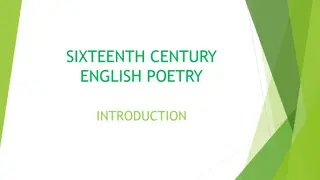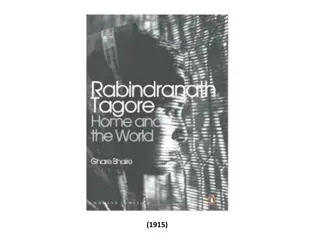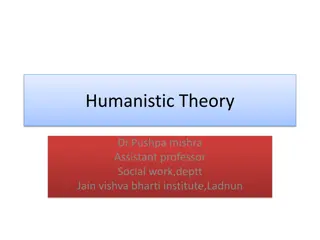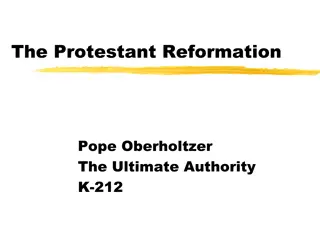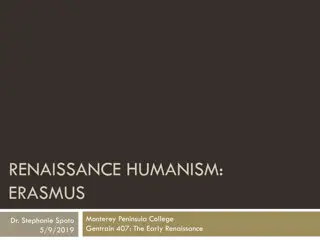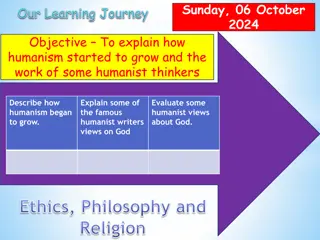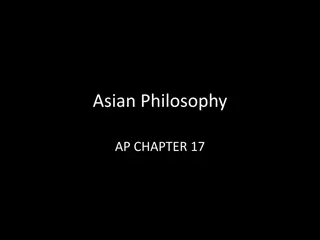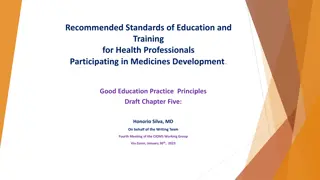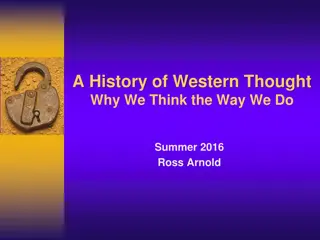Humanism in Geography: Methodology and Themes
Humanistic geography emerged as a critique of mechanistic spatial models during the quantitative revolution, emphasizing human agency, consciousness, and creativity in understanding the complexities of human-place relationships. It rejects geometric determinism and celebrates individual dignity, pro
0 views • 4 slides
The Enemy - Pearl S. Buck's Tale of Conflict and Compassion
The Enemy, a story by Pearl S. Buck, explores the conflict between East and West during the backdrop of the US and Japan war. Dr. Sadao Hoki, a Japanese surgeon with American training, faces a moral dilemma when he helps a wounded American man, Tom, only to struggle with the decision to kill him. Th
1 views • 17 slides
Exploring Humanism and Renaissance: A Journey through Past Philosophies and Societal Changes
Delve into the world of Humanism and the Renaissance period, examining the intersection of individuality, societal norms, and religious beliefs. Uncover the role of key figures like Francesco Petrarch in shaping intellectual pursuits and challenging traditional ideologies. Reflect on how these philo
0 views • 13 slides
E.M. Forster: Humanism, Sexuality, and Colonialism in Literature
Forster, a prominent humanist and author, intricately weaves themes of personal connections, class struggles, and societal restrictions in his works. His exploration of sexuality, particularly the shift from heterosexual to homosexual love, is notable. Through novels like "A Passage to India," he de
0 views • 11 slides
Black Atlantic Perspective: Critiques and Affirmations within the Western Tradition
The Black Atlantic Perspective offers a unique critique from within the Western tradition, challenging Eurocentric narratives and promoting the ownership of Western civilization by marginalized voices. Rejecting the label of a slave race, this perspective embraces Christian humanism while condemning
0 views • 7 slides
The Renaissance Movement: Historical Perspective and Impact on English Literature
The Renaissance, meaning "rebirth," was a period of revival in classical learning, centered in Italy after the Turkish Conquest of Constantinople in 1453. This era saw a shift from medieval beliefs to human-centered thinking, with a focus on exploring the limitless possibilities of the human mind an
0 views • 9 slides
Unveiling the Renaissance: A Journey of Rebirth and Humanism
Explore the transformative era of the Renaissance, a period of rebirth, flourishing art, literature, and humanistic revival after the dark Middle Ages. Discover how individuals embraced humanism, literacy thrived with the printing press invention, and the beauty of classical works was rekindled, sha
0 views • 11 slides
The Renaissance: A Period of Innovation and Transformation
The Renaissance period marked a significant shift in European history, bridging the gap between the Middle Ages and the modern era. It was characterized by a renewed focus on humanism, art, education, and science, leading to groundbreaking developments in various fields. This era saw the rise of pri
0 views • 31 slides
Patient Feedback Summary for Neuro-Oncology Services at Bristol Haematology Oncology Centre
Patient feedback for the Neuro-Oncology services at Bristol Haematology Oncology Centre reflects a consistently positive experience. Patients found the staff to be supportive, informative, attentive, caring, and empathetic. The professionalism, humanism, kindness, and generosity of the oncology team
0 views • 9 slides
Understanding Confucius: Key Concepts and Philosophical Ideals
Confucius, born during the Zhou Dynasty, emphasized virtue, social reform, and humanism in his teachings. He focused on values like Ren (human-heartedness) and key concepts such as De (virtue) and Li (propriety). By studying human practices, he sought to achieve goodness and harmony. Explore the phi
0 views • 23 slides
Overview of Sixteenth Century English Poetry and the Renaissance
The introduction provides insights into sixteenth-century English poetry, the Renaissance era, and the defining characteristics of the period. It delves into the intellectual, religious, political, and social contexts of the time, highlighting key figures and movements like the Reformation, the Grea
1 views • 12 slides
Rabindranath Tagore: A Literary Pioneer and Social Critic
Rabindranath Tagore, a prominent figure in Indian literature and culture, was the first non-European to win the Nobel Prize in Literature in 1913. He bridged the gap between Indian and Western cultures through his works, particularly evident in "The Home and the World." Tagore's involvement in the S
0 views • 17 slides
Understanding Humanistic Theory of Personality and its Key Concepts
Humanistic theory emphasizes the active role individuals play in their behavior, with proponents like Abraham Maslow and Carl Rogers. It focuses on humanistic psychology, existentialism, and humanism, emphasizing personal meaning and values. The theory argues for the innate goodness of individuals a
0 views • 8 slides
The Protestant Reformation and its Impact on Europe
The 16th-century Protestant Reformation was a result of humanism and intellectualism, challenging the authority of the Catholic Church. This movement led to a revolution in religious thought, shaped identities, and contributed to the development of modern democracy. Calls for reform from figures lik
0 views • 21 slides
Erasmus: Prince of Humanism and Renaissance Scholar
Explore the life and contributions of Erasmus, a prominent Christian humanist of the Northern Renaissance. Known for his scholarly works, Erasmus played a vital role in the revival of classical learning and the development of humanistic thought in Europe. His translations and philosophical reflectio
0 views • 12 slides
The Growth of Humanism: From Renaissance to Enlightenment
Humanism began to flourish during the Renaissance and the Enlightenment periods, challenging traditional religious beliefs and emphasizing the value of human reason, rights, and autonomy. Influential humanist thinkers questioned the authority of the Church, valued human creativity, and promoted indi
0 views • 26 slides
Development of Confucianism in Ancient China
During the Warring States Period in ancient China, Confucianism emerged as a response to the chaos and societal collapse. Confucianism, along with other philosophies like Daoism, Legalism, and Mohism, offered different solutions to restore order and harmony in society. Key figures like Mengzi and Ha
0 views • 27 slides
Guidelines for Health Professionals in Medicines Development: Chapter 5 Overview
The draft chapter outlines key principles and recommendations for education and training of health professionals in medicines development. It discusses good practice in education, emphasizes active learning, feedback, and diverse talents. The chapter includes recommendations on teaching humanism, ef
0 views • 7 slides
Evolution of Western Philosophical Thought: From Idealism to Humanism
Explore the rich history of Western philosophical thought from the idealism of Plato to the humanism of Whitehead. Trace the progression of thought, including materialism, rationalism, skepticism, and relativism, as key thinkers like Descartes, Kant, Marx, and others shaped our understanding of real
0 views • 16 slides
